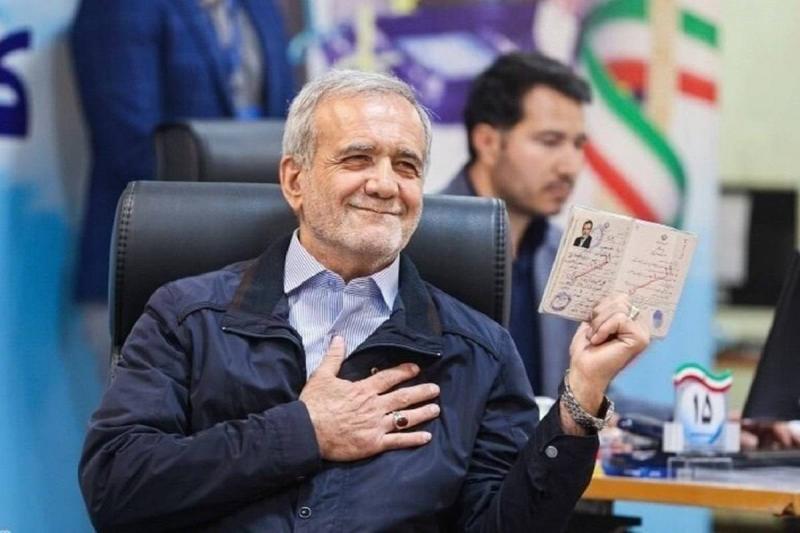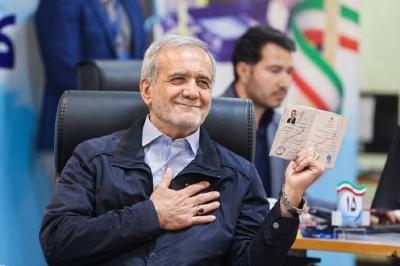The election of the reformist Massoud Bazeshkian as President of Iran can be regarded as an important event and a significant development towards betterment. This might have been possible had recent past experiences allowed for it. However, these experiences, particularly those of Mohammad Khatami and Hassan Rouhani, do not inspire optimism. Khatami and Rouhani were considered reformists, yet they failed to effect any change in Iran, which has continued to suffer from its deep-rooted internal crises since the establishment of the "Islamic Republic" in 1979.
The persistent crises are practically evidenced by the Iranian regime's insistence on the slogan of "exporting the revolution" to the entire region, based on the premise that this is the best defense for the regime's continuity. This system is controlled by clerics, symbolized by the alliance between Supreme Leader Ali Khamenei and the "Revolutionary Guard." Khamenei controls all significant strategic decisions while the Revolutionary Guard manages all aspects related to keeping Iranian citizens under control domestically and maintaining Iranian tools abroad, specifically the militias fighting in Iraq, Syria, Lebanon, and Yemen in order to protect the regime in Iran.
Undoubtedly, Bazeshkian's victory reflects a desire among the Iranian people for a fundamental change in their way of life. However, the reality suggests that this desire cannot be fulfilled by a person like the new president, who cannot go far in liberating the country from the grip of hardliners armed with the "Islamic Republic" constitution. These hardliners have consistently obstructed any genuine change whenever the Iranian people have revolted, seeking to regain their freedom and expressing a desire to belong to the civilized world.
If the Iranian regime had any real desire for deep-rooted change, it would have allowed anyone wishing to run for the presidential elections to participate. In fact, the regime permitted only Bazeshkian to run among all the reformists, who was the Minister of Health during Khatami's presidency. If Khamenei had the slightest doubt about the man's loyalty, he would not have ascended to the presidency. Khamenei is fully aware that Bazeshkian will not raise any genuine objections to the regime's conduct, but rather represents a "gift from heaven" for a regime seeking to alleviate internal tensions.
This tension became apparent in 2022 with the case of Mahsa Amini, a girl killed by the morality police in Tehran under the pretext of not wearing her hijab as required. It is not about the hijab, or whether to wear it or not, as every individual is free to act as they wish without coercion. It pertains to the exercise of personal freedom, particularly for Iranian women who enjoyed significant rights during the Shah's era.
The new Iranian president speaks beautifully and bases his comments on scientific data. For example, he states, "We cannot achieve 8% growth annually without opening our borders and engaging with governments in the region and the world. To achieve this goal, we need $200 billion annually. This is impossible under the current circumstances. Therefore, it is necessary to resolve our problems related to our international relations."
However, beautiful words seem insufficient, as does the new president's appointment of Mohammad Javad Zarif, the former foreign minister who played a role in negotiating with the West regarding the nuclear agreement, as an advisor. Ultimately, beautiful words will remain just that if they are not accompanied by actions indicating the "Islamic Republic" of Iran's abandonment of its delusions based on the principle of "exporting the revolution."
Had the Iranian regime been a truly successful one, ordinary citizens would not have seized the opportunity of the presidential elections to vote for Bazeshkian instead of the hardliner Saeed Jalili, who is viewed by the Iranian public as belonging to the "Taliban" school. Sooner or later, it will become clear whether the new Iranian president can make a difference, distinguishing himself from his predecessor Ebrahim Raisi, who was killed in a helicopter crash along with Foreign Minister Hossein Amir-Abdollahian on May 19.
To ensure that change occurs, it is enough for Lebanon, which has become a hostage to Iran, to be released and transformed from what is now closer to an Iranian colony. It goes without saying that Lebanon has become an Iranian hostage in light of the country's subjugation under the influence of Hezbollah, which is merely a brigade of the Iranian Revolutionary Guard. Can Bazeshkian take any positive steps regarding Lebanon and cease the destruction of an entire country to consolidate the regional role of an "Islamic Republic" that has taken it upon itself to exploit the Palestinian cause to the greatest extent amid the Gaza war?
Lebanon will be one of the tests available for the new Iranian president, especially since Iran has now taken control over the decision of war and peace in Lebanon after deciding to open a southern front. This decision has brought nothing but misery, destruction, and devastation to the Lebanese people of the border villages and has not benefited "Hamas" or Gaza in any way.
Certainly, there are other tests ahead for Bazeshkian in Iraq, Syria, Lebanon, and Yemen, as well as the test of adherence to the agreement signed by the "Islamic Republic" with Saudi Arabia under Chinese sponsorship on March 11, 2023. Iran has committed to what suits it from the terms of the agreement. It has halted attacks on Saudi territories, which were conducted by the Houthis from Yemeni territory. In return, it has not ceased any interventions in the internal affairs of other countries as stipulated in the agreement.
The great fear is that the new Iranian president may be used as a tool to relieve internal Iranian tensions while Iran remains a prisoner of the illusion of being the dominant power in the region, an illusion that has so far brought only calamities!




